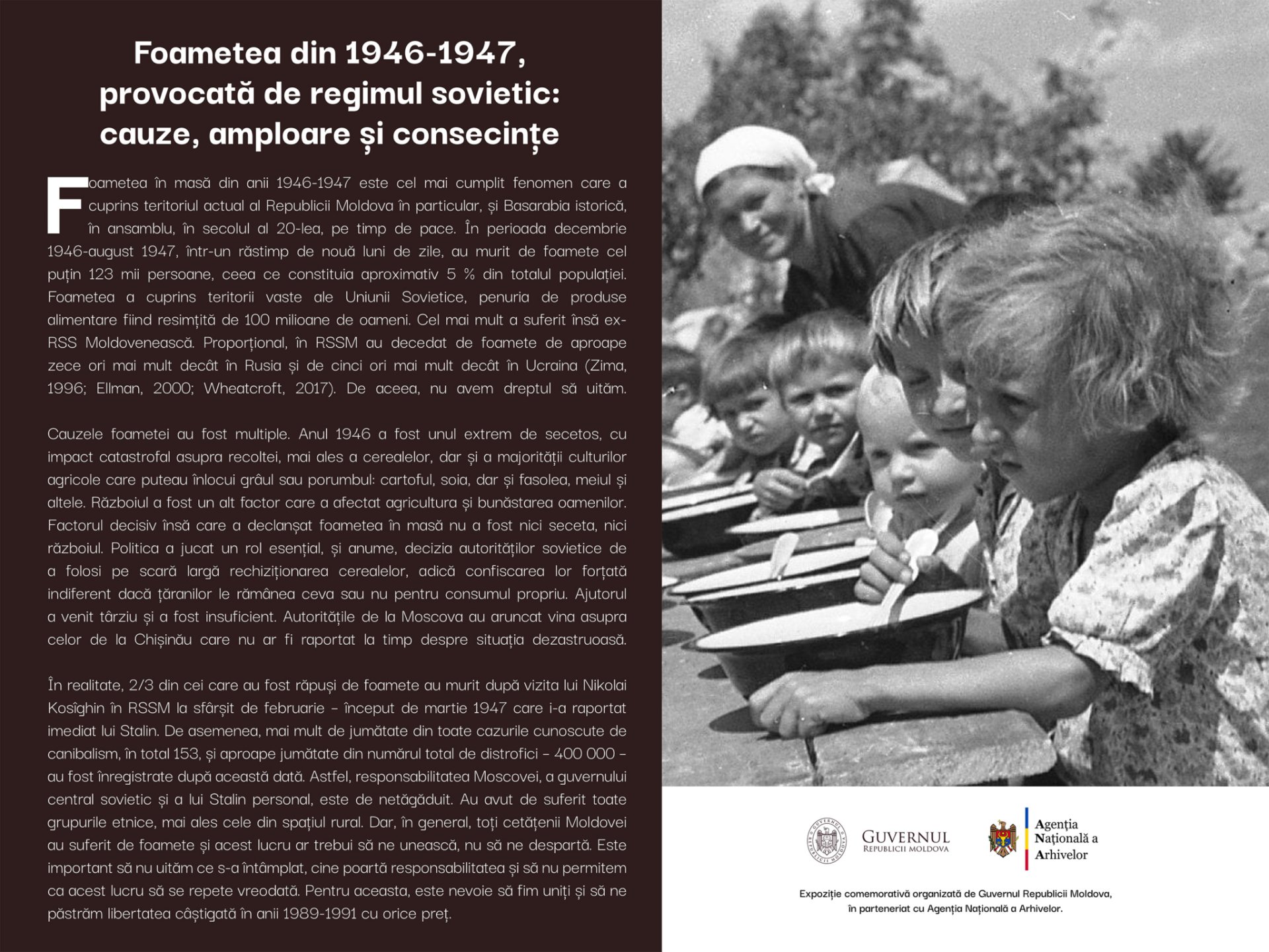
Famine commemoration week to be organized in education institutions of Moldova
The Famine Commemoration Week will be organized In general, vocational, technical, and higher education institutions during April 29-May 6, in order to keep alive the memory of the organized famine of 1946-1947, which historians describe as one of the most tragic pages in the country’s history.
“We commemorate the famine of 1946-1947 - a lesson of truth for the future. We cannot build a strong future without confronting the truth about the past. On these days, we mark one of the most painful pages in the country's history - the organized famine of 1946-1947, which was a tragedy caused by the Soviet regime, with tens of thousands of lives lost and hundreds of thousands marked for life. After the Easter holiday, as of April 29 till May 6, all schools and universities of the country will organize the Famine Commemoration Week,” said the government’s spokesperson, Daniel Voda.
At the same time, a commemorative exhibition about the famine of 1946-1947 is organized outside the government building. The exhibition is also available online on the National Archives Agency's webpage, considered as an educational and reflective resource. It includes 12 topic-related posters, which show the desperate protests of women demanding bread, the drama of starving children, tragic attempts to cross the Prut, “garrets’ sweeping,” and brutal repression. Visitors can discover archival documents, photographs, maps and unique graphs - all based on primary sources.
Also, museums and cultural institutions will organize public lectures, exhibitions, and discussions with historians and writers about the organized famine of 1946-1947. They will take place not only in Chisinau, but also throughout the country.
“The events also reach Edinet, Falesti, Ivancea and in the Gagauz autonomy, so that lessons of the past are known to all generations. We commemorate the famine of 1946-1947, because it is a lesson of truth, a duty of memory. Let's not forget, let's speak, learn and discuss it, because memory does not die, history cannot be erased. We pay tribute to those who died of hunger and to those who survived with dignity. Their story is our story too,” Daniel Voda also said.
On the third Saturday of April, the victims of one of the most tragic pages in Moldova’s history—the organized famine of 1946-1947—are commemorated.
According to the National Archives Agency, this was one of the greatest humanitarian catastrophes to hit the current territory of Moldova in the 20th century. It was not an inevitable natural calamity, but a tragedy exacerbated by the authoritarian and repressive policies of the Soviet regime. According to statistics data, in just a few months, more than 123,000 people died of hunger, accounting for about 5 per cent of the population of the Moldovan Soviet Socialist Republic. Proportionally, Soviet Moldova was the worst hit region in the entire Soviet Union, with a death rate ten times higher than the one of Russia and five times higher than of Ukraine.
Moldovan PM's message on Easter Holidays
PHOTO GALLERY // The Easter Holiday in Moldova. Traditions and customs
Head of state says Moldovans should look into future with confidence on Easter Holiday
Orthodox, Catholic Christians celebrate Resurrection of the Lord
PHOTO GALLERY // Holy Fire brought to Moldova
Commemorative exhibition on 1946–1947 Famine opened outside Moldovan government's building
Restricted access to Chisinau International Airport on Easter Days
Weather forecast in Moldova for 19-20 April
VIDEO // Famine of 1946-1947: Tragedy seen through eyes of the then children
Moldova to use modern IT system to combat money laundering
PHOTO GALLERY // Gala of laureates of GALEX National Awards, the 15th edition
MEP: Moldova to be priority in European Union's budget for next seven years
State Flag Day celebrated on 27 April
Moldova joins two new European programs
No mobile phones during classes: Moldovan education conducts study to analyze implementation of new rule in schools
Moldova to issue modernized passports and travel documents from 1 January 2026
Moldovan Prime Minister: We are close to people. We offer Easter aid to all families with young children and those supporting people with disabilities
Moldovan president to attend European People's Party Congress in Spain
Easter family aid to be available starting 2 May
New deputy head appointed at Moldsilva Agency
Moldovan speaker: Postal voting to be maintained in parliamentary elections
New EU funding prospects: Moldova can access larger budgets through Interreg programs
New energy efficiency amendments to support vulnerable consumers
People with at least 40 years of contributions to receive minimum pension of 3,300 lei
Nearly 230,000 people to get state Easter aid worth 470 million lei


